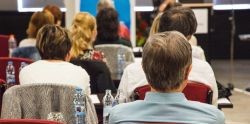Title: Computer simulations of co-crystalline electrolytes for all-solid alkali metal batteries
Speaker: Arun Venkatnathan (IISER, Pune, India)
Time: May 28, 2020, 10:00–11:00
Location: Online (MS Teams)
Dr. Arun Venkatnathan is an Associate Professor in Chemistry at the Department of Chemistry and the Centre for Energy Science at IISER, the Indian Institute of Science Education and Research in Pune, India. Dr. A. Venkatnathan group's webpage may be found at: http://www.iiserpune.ac.in/~arun/
Abstract | Soft-solid co-crystalline electrolytes for lithium/sodium ion batteries exhibit excellent thermal stability and high ionic conductivity. These electrolytes are matrices of organic solvents (e.g. DMF, adiponitrile) coordinated with cations (Li+/Na+), where counter anions occupies the remaining space in crystals. In this talk, I will present a molecular understanding of structure, thermal stability and ion transport in some electrolytes from Molecular Dynamics simulations. The simulations mimic the processes of decomposition/melting of electrolytes and show a liquid-like surface layer on the nano-sized grains of these electrolytes as seen from several experiments performed by colloborators. The simulations also examine the dynamics of ions on the surface and bulk. The insights from simulations combined with experiments is expected to lead to the development of better and safer electrolytes for batteries.
P. Prakash, J. Aguirre, M. Van Vliet, P. Chinnam, D. Dikin, M. Zdilla, S. Wunder, A. Venkatnathan, Unravelling the structural and dynamical complexity of the equilibrium liquid grain-binding layer in highly conductive organic crystalline electrolytes, J. Mat. Chem. A, 6, 4394 (2018).
B. Fall, P. Prakash, M. R. Gau, S. L. Wunder, A. Venkatnathan and M. J. Zdilla, Experimental and theoretical investigation of the ion conduction mechanism of tris(adiponitrile)perchloratosodium, a self-binding, melt-castable crystalline sodium electrolyte, Chemistry of Materials, 31, 8850 (2019).
Seminar | The CCER seminars are aimed at researchers interested in computational approaches to (energy) research. The seminar is small-scale, typically 15 participants, and interactive, offering lots of room for discussion. If you would like to attend, just This email address is being protected from spambots. You need JavaScript enabled to view it. so as to receive the MS Teams meeting link.






